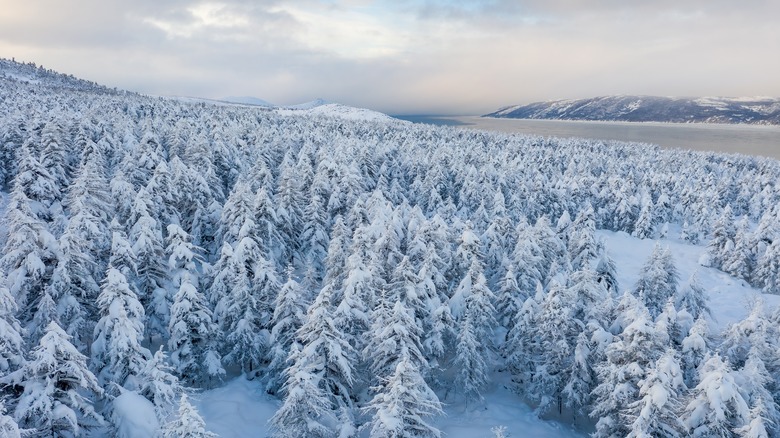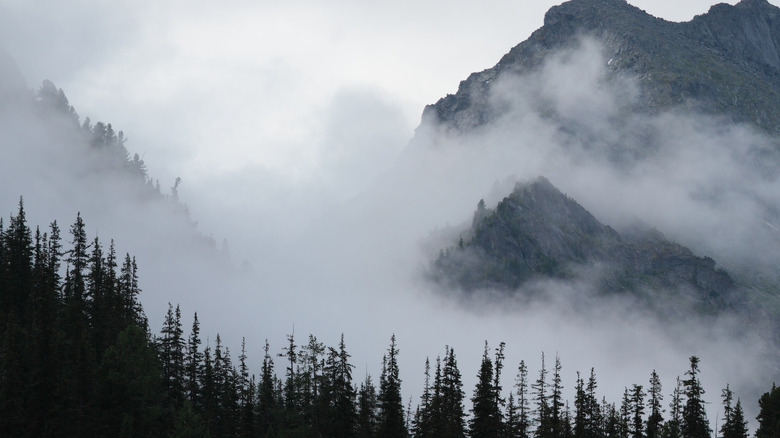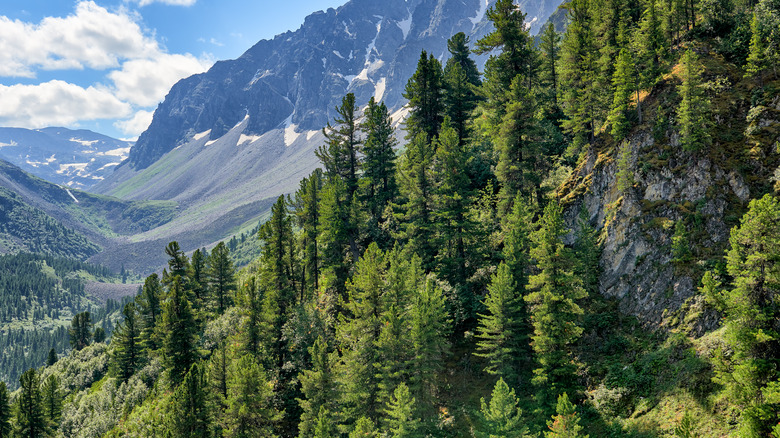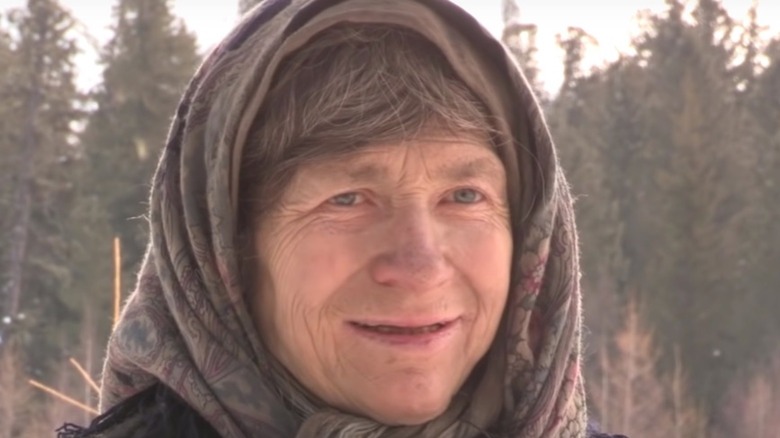The Russian Family That Spent Four Decades Alone In The Siberian Wilderness
The Siberian forest is a desolate, harsh, uninhabitable land. It's 5 million square miles of wilderness, some of the last left on the planet. It's not the kind of place that's kind to humans. Instead, it's home to wolves and bears, white-water rivers, and steep mountains. This is exactly why the discovery of a family of six living 150 miles from the nearest hint of civilization was such an astounding discovery for those who happened upon them one day in 1978 (via the Smithsonian).
Four geologists were scouting the area for iron ore, according to Mental Floss. High up in a helicopter, they searched for a place to touch down. But the thick forest of birch and pine trees and steep valley walls made their task nearly impossible. Until they spotted a puzzling site — a garden thousands of feet up the side of a mountain, one clearly made by humans Why was it there? It could only mean one thing: a person had made it. Someone had to be out there.
A stunning discovery
The geologists managed to find a place to land nearby and trekked over to the spot with the manmade garden, bringing along food to offer the garden's owners and a gun in case visitors weren't welcome, according to Mental Floss. They found a lot more than just a garden — a small hut was also there. One of the geologists on the trip, Galina Pismenskaya, described it as blackened by time and the elements and covered with bark, poles, and planks. "If it hadn't been for a window the size of my backpack pocket, it would have been hard to believe that people lived there," she said (via Gizmodo).
An older man with an unkempt beard, disheveled hair, and clothes made from sacks came out of the hut barefoot, according to the Smithsonian. Not knowing what to say to him, Pismenskaya said, "Greetings, grandfather! We've come to visit!"
Just who were these people alone in the wilderness?
The man looked frightened but eventually spoke to his visitors. According to Galina Pismenskaya, the first words out of his mouth were (via the Smithsonian): "Well, since you have traveled this far, you might as well come in." His name was Karp Lykov. Living with him in the wilderness were his four children, two daughters )Natalia and Agafia) and two sons (Savin and Dmitry). Their mother, Akulina, had lived with them until she died from starvation.
At that first meeting, the geologists offered the family food, but they turned it down. Karp spoke in a way the visitors understood. The girls seemed to have their own unique way to communicate, described by Pismenskaya in the Smithsonian as "slow, blurred cooing." Over the course of the first visit meeting and several more to come, the geologists would come to know a lot more about the family in the woods: that they'd been living there, far from the rest of humanity for 40 years, that they'd escaped deep into the forest because they feared for their lives, and that they'd survived the harsh conditions without any outside help at all.
How the Lykov's survived
Food is plentiful in the forest if you are a bear. Berries are all around. But for people, not so much. The family survived by eating berries and pinenuts and eventually learned to trap animals for food and hides, according to the Smithsonian. The youngest daughter, Agafia, described one particularly harsh period in the late 1950s as the "hungry years" and said they ate "roots, grass, mushrooms, potato tops, and bark. We were hungry all the time. Every year we held a council to decide whether to eat everything up or leave some for seed."
While they were living alone in the wilderness, the children learned to read and write with prayer books and a family bible, according to History Daily. They used sharpened birch sticks dipped into honeysuckle juice to do the job of pens and ink. According to Russian journalist Vasily Peskov, their entertainment "was for everyone to recount their dreams."
Why they were there in the first place
The Lykov family belonged to the Old Believers, a part of the Russian Orthodox Church (via Mental Floss). But when the church made changes to its rituals which the Old Believers found blasphemous, they refused to follow along. The church began imprisoning, torturing, and even executing members of the Old Believers, persecution that lasted for centuries.
After Karp's brother was killed in 1936 by a Soviet patrol, Karp fled with his wife Akulina and two of their children — 9-year-old son Savin and 2-year-old daughter Natalia (the other two were born later in the forest) — to a place they thought they would be safe. They escaped deep into the desolate Siberian wilderness for safety. The Lykovs remained there isolated, unware of World War II or that humans had landed on the moon until their accidental discovery four decades later (via History Daily).
What happened to the Lykov family?
Akulina died years before the geologists discovered the family. 1961 was an extremely difficult year — there was even snow in June. Frost killed everything in the family's garden, and they were left trying to survive by eating shoes and tree bark, according to the Smithsonian. Without enough food to eat, Akulina went hungry so her children could eat and ended up dying of starvation that year. Two decades later, in 1981, Dmitry, Natalia, and Savin passed away within several days of another — two from kidney failure and one from pneumonia. Their father, Karp, died in 1988. Though the family had been given several opportunities to leave the forest and live in a village, they refused, according to History Daily.
Agafia (above) remained living alone in the forest. In 2013, Vice paid her a visit. At the time, she was 70. They found her to appear nimble and healthy. Her home now had several cabins that others had helped her build. She also had chickens and goats and a lot of cats. As of 2021, Agafia was still alive and living in the forest at the age of 77. Viktor Nepomnyashchiy, the director of the Khakassky Nature Reserve, paid her a visit (via The Siberian Times). At the time, she agreed to accept a solar panel to charge a satellite phone and had moved into a new house.





